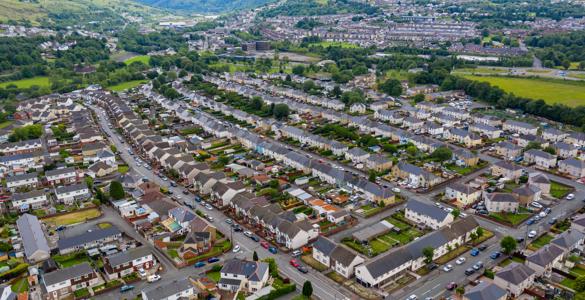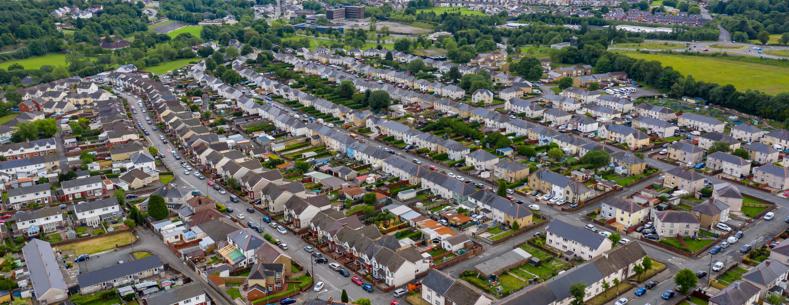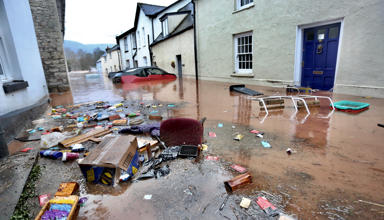This is the ninth article of our ten-part series looking at the Welsh Government’s progress in delivering its Programme for Government (PfG). Here, we explore the well-being objective to “Make our cities, towns and villages even better places in which to live and work”.
There are 13 specific commitments beneath this Cabinet-wide objective, which the Welsh Government has given an update on in its PfG annual report. There are also relevant Ministerial commitments.
Browse our full #ProgrammeforGovernment series, published to date.
This broad objective encapsulates a wide range of specific commitments spanning a variety of policy areas. Decarbonisation of homes, housing supply, homelessness, second homes, holiday lets, speed limits, pavement parking, partnership working and regional democratic accountability, are all captured here, along with aspects of public sector procurement and the need for a strategy for the timber sector.
So, rather than addressing the question of whether the overall objective is being met, this article focuses on the latest position of a handful of the specific commitments and activities that sit beneath it.
Second homes and holiday lets
The Programme for Government (PfG) commits the Welsh Government to “Take forward actions to cap the number of second homes, bring more homes into common ownership and licence holiday lets”. Accordingly, the Welsh Government has legislated to set higher letting criteria for self-catering properties to be listed for non-domestic rates. Also, since April 2023, local authorities have the discretionary power to charge higher council tax premiums of up to 300% on long-term empty dwellings and second homes.
Land Transaction Tax (LTT) is charged on the purchase of property or land in Wales and certain residential transactions are subject to higher rates of LTT. These include purchasing buy-to-let properties, buying a second home or holiday home, buying a new property while trying to sell an existing one, and companies such as social housing providers buying properties.
The Welsh Revenue Authority (WRA) has published LTT statistics at local authority level, comparing higher rates transactions as a percentage of all residential transactions in 2022-23 with the previous year. The local authorities with the largest percentage changes were:
- Gwynedd (decrease of 5 percentage points);
- Pembrokeshire and Ceredigion (each with a decrease of 4 percentage points), and within that, the Pembrokeshire Coast National Park area which had a decrease of 12 percentage points; and
- Isle of Anglesey (decrease of 3 percentage points).
The WRA’s analysis concludes:
There has been reduced higher rates activity in some areas of Wales, particularly in some of the western or northern local authorities. Possible reasons for this could include the impact of wider economic conditions upon transactions or second homes policies beginning to impact upon transactions.
The WRA has recently introduced a new question on the LTT return asking about the intent behind residential purchases at the higher rates of tax, including second home purchases and buy-to-let properties. This may potentially allow the impact of the Welsh Government’s policies on second homes to be tracked more accurately in the future.
The Welsh Government consulted last winter on a statutory licensing scheme for all visitor accommodation providers in Wales. It published a summary of the more than 1,500 responses in July.
The most common overarching themes identified in the responses were:
- the view that the proposed statutory licensing scheme would create significant administrative and financial burden;
- the suggestion that the visitor accommodation market is highly competitive and thus already operates efficiently; and
- general disagreement with any form of statutory licensing, without offering any further explanations for this view.
However, the Welsh Government’s summary of responses also notes:
Across most questions, the degree of agreement was consistently split between demographics. Large tourism organisations and local authorities were more likely to agree with the proposals, while visitor accommodation providers and residents most often disagreed.
The Welsh Government has said:
…final decisions on how the scheme is run will be taken following full consideration of consultation responses.
It also noted, “some concerns have been raised around the administrative and financial pressure the scheme could place on businesses and local authorities” and the scheme will need to be “proportionate”.
Transport
The Welsh Government’s plan to reduce the default speed limit on restricted roads from 30mph to 20mph is moving forward. The change took effect on 17 September this year. Local authorities have been working to implement the policy, funded by the Welsh Government, including identifying exceptions which will remain at 30mph.
While 20mph limits and zones have been widely used across the UK on an ad hoc basis, Wales is the first UK nation to make them a default limit. The Deputy Minister for Climate Change, Lee Waters, has said the change is integral to achieving the modal shift targets in the Wales Transport Strategy and improving road safety. The issue has been discussed again in the Senedd recently, with the Deputy Minister making a statement on 12 September and a debate being held the following day.
There has been vocal opposition to the policy in some quarters – including a Senedd petition which attracted about 22,000 signatures. While 53% of respondents to the consultation held in 2021 opposed the policy, the Welsh Government undertook a survey of public attitudes in 2020 which found strong support for the plan (81%), particularly among parents. The Deputy Minister has acknowledged in the media that support, shown by surveys, has declined as introduction of the new limit has approached but he says he expects it to rise as the public become accustomed to the change.
The Explanatory Memorandum accompanying the Order changing the speed limit estimated costs of £32.5m to implement the change. Research commissioned by Public Health Wales estimated it would save Welsh public services £100m per year.
In contrast, the PfG annual report is silent on progress in proposals to ban pavement parking. These have been delayed following a letter from WLGA leaders to the First Minister which highlighted the “sheer volume” of transport policy changes local authorities are being required to implement. The Welsh Government originally planned to consult before introducing legislation by the end of 2023. However, in April, the Deputy Minister issued a statement saying consultation would be delayed until next year in response to pressure on local government.
Decarbonisation of homes
The PfG committed to “decarbonise more homes through retrofit, delivering quality jobs, training and innovation using local supply chains”. The Climate Change, Environment and Infrastructure (CCEI) Committee has taken an active interest in this area during the Sixth Senedd – looking at Welsh Government progress in decarbonising Wales’ housing stock.
Whilst noting good progress within the social housing sector, particularly through the Optimised Retrofit Programme (OHP) and Innovative Housing Programme (IHP) the Committee found the Welsh Government still has an “inordinate” amount of work to do to support decarbonisation of Wales’ owner occupied and private rented sector homes. The Committee also heard that progress in delivering many of the recommendations from the Welsh Government commissioned report from the Decarbonisation of Homes Advisory Group has been slow.
The latest progress report from the Committee on Climate Change shows emissions from residential buildings in Wales increased in 2020, and highlights the need for “a credible strategy for decarbonising existing owner-occupied and private-rented homes, and a clear understanding of the scale of this challenge”. And with energy prices still high, and estimates suggesting around 45% of Welsh households are living in fuel poverty, all eyes will be on the development of the next iteration of the Warm Homes Programme, and how this can help tackle the dual challenge of fuel poverty and decarbonisation.
Timber strategy
The Deputy Minister for Climate Change led a ‘deep-dive’ into removing barriers to tree planting in Wales in early 2021 (tree planting rates in Wales have been poor for decades). Recommendations coming out of the deep-dive included a strategy to coordinate timber supply and construction. In July 2021, he said:
Wales is capable of growing high quality timber and there is an opportunity to increase the amount of Welsh wood used in higher value added areas… The discussions of the deep dive will form a starting point for the development of a timber industrial strategy for Wales.
In March 2023 the CCEI Committee asked the Welsh Government why the timber industrial strategy had yet to come forward. The Welsh Government responded:
A Deep Dive Delivery Panel has been established to oversee the delivery of the recommendations. Work on the Timber Industrial Strategy is underway with the aim of developing it by the end of 2023.
The Climate Change Commission’s progress report on reducing emissions in Wales (June 2023) also called for the timber industrial strategy to be published:
This document should set out an ambitious target for increased use of Welsh-grown timber in construction and introduce policies that encourage the use of timber in the construction of buildings in Wales.
The Annex to the PfG Annual Report states that “progress has been made towards delivering a timber industrial strategy for Wales” but does not give any indication as to whether the strategy will be published before the end of this year.
Explore the Programme for Government, its objectives and commitments
- 1. Provide effective, high quality and sustainable healthcare
- 2. Protect, re-build and develop our services for vulnerable people
- 3. Build an economy based on the principles of fair work, sustainability and the industries and services of the future
- 4. Build a stronger, greener economy as we make maximum progress towards decarbonisation
- 5. Embed our response to the climate and nature emergency in everything we do
- 6. Continue our long-term programme of education reform, and ensure educational inequalities narrow and standards rise
- 7. Celebrate diversity and move to eliminate inequality in all of its forms
- 8. Push forward towards a million Welsh speakers, and enable our tourism, sports and arts industries to thrive
- 9. Make our cities, towns and villages even better places in which to live and work
- 10. Lead Wales in a national civic conversation about our constitutional future, and give our country the strongest possible presence on the world stage
Article by Ben Stokes, Andrew Minnis, Chloe Corbyn and Elfyn Henderson, Senedd Research, Welsh Parliament






